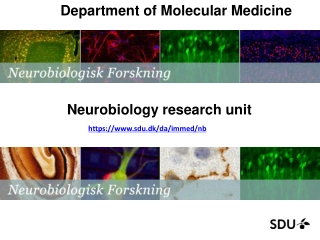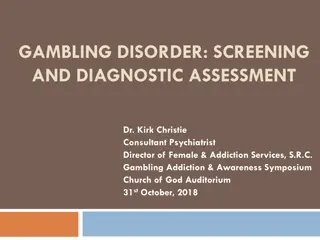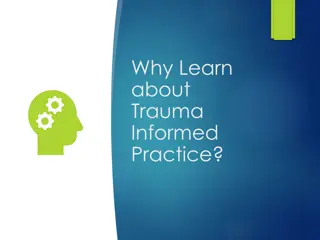Neurobiology research unit
The Department of Molecular Medicine's Neurobiology research unit focuses on improving the understanding of the central nervous system's response to injury and disease, including multiple sclerosis, Alzheimer's disease, Parkinson's disease, and stroke. They utilize molecular, cellular, and histologi
0 views • 15 slides
Understanding Trauma's Impact on the Brain: A Comprehensive Overview.
This content delves into the neurobiology of trauma, exploring how different brain systems are affected by traumatic experiences. It covers topics such as amygdala hijack, coping skills, and the Polyvagal Theory. A survivor's experience is shared to provide insight into the real impact of trauma on
2 views • 29 slides
Understanding Gambling Disorder: Screening and Diagnostic Assessment
Dr. Kirk Christie, a Consultant Psychiatrist, delves into the world of gambling disorder, exploring definitions, neurobiology of addiction, screening instruments, DSM-V criteria, and harmful alcohol usage. Discover the differences between nondisordered, social, and problematic gambling behaviors, al
0 views • 27 slides
Introduction to Dynamic Structural Equation Modeling for Intensive Longitudinal Data
Dynamic Structural Equation Modeling (DSEM) is a powerful analytical tool used to analyze intensive longitudinal data, combining multilevel modeling, time series modeling, structural equation modeling, and time-varying effects modeling. By modeling correlations and changes over time at both individu
0 views • 22 slides
Shunda Creek Wilderness Addiction Treatment for Young Men
Shunda Creek offers a 90-day residential and wilderness-based addiction treatment program for young men aged 18-24. The program, known as The Shunda Journey, focuses on five phases including engagement, acceptance, community, courage, wilderness/adventure, compassion, relationship, and commitment. I
0 views • 9 slides
Understanding Trauma: Key Elements and Neurobiological Impact
Trauma-informed practice involves being aware of trauma's presence, understanding its effects on physical and emotional well-being, and working with trauma symptoms constructively. Trauma can arise from direct exposure, witnessing, or indirect experiences, affecting memory encoding and retrieval. Th
0 views • 23 slides





